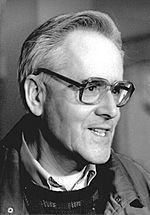Walter Romberg facts for kids
Quick facts for kids
Walter Romberg
|
|
|---|---|
 |
|
| Minister of Finance | |
| In office April 1990 – August 1990 |
|
| Prime Minister | Lothar de Maizière |
| Preceded by | Uta Nickel |
| Succeeded by | Werner Skowron |
| Minister without Portfolio | |
| In office 1989–1990 |
|
| Prime Minister | Hans Modrow |
| Personal details | |
| Born | 27 December 1928 Schwerin, German Empire |
| Died | 23 May 2014 (aged 85) Teltow, Germany |
| Resting place | Schwerin, Germany |
| Nationality | German |
| Political party | Social Democratic Party |
Walter Romberg (born December 27, 1928 – died May 23, 2014) was a German politician. He served as the finance minister of East Germany.
Contents
Early Life and Education
Walter Romberg was born in Schwerin, Germany, on December 27, 1928. After finishing school, he went on to study physics and mathematics starting in 1947. He later earned a special degree called a "Dr. rer. nat." in mathematics. This is like getting a PhD in science.
Career Highlights
Romberg worked at the East German Academy of Sciences. From 1965 to 1978, he was the main editor for a math publication called Zentralblatt MATH.
In 1989, he joined the Social Democratic Party (SPD). He became a minister without a specific department in the government led by Prime Minister Hans Modrow. This was from 1989 to 1990.
After the first free elections in East Germany on March 18, 1990, Romberg was chosen for a very important job. On April 12, 1990, he became the Minister of Finance in the government led by Prime Minister Lothar de Maizière. He was one of the most important members of the Social Democratic Party in this government.
On May 19, 1990, Romberg and West Germany's finance minister, Theo Waigel, signed a special agreement. This agreement was to combine their economies. It also made the Deutsche Mark (West German money) the only official money in both East and West Germany by July 2, 1990.
Why Romberg Left Office
Walter Romberg was removed from his job on August 15, 1990. This happened because he supported some parts of a treaty about how tax money would be shared after Germany reunited. He also kept asking West German officials for more money to help struggling businesses in East Germany and to pay for social support.
Another reason was that East Germany's economy was getting much weaker very quickly. Romberg had also warned about the financial challenges of reuniting Germany. He had a cautious view about it.
After Romberg left, Werner Skowron took over as the finance minister. The Social Democratic Party left the government on August 20, 1990, saying the way Romberg was removed was not fair. Romberg then worked at the European Parliament until 1994.
Romberg's Views on Unification
In 1991, after Germany became one country again, Romberg spoke at Humboldt University. He said that the leaders of West Germany did not fully understand how different the economies of the two countries were.
Later Life and Family
Walter Romberg was married and had three sons. In 1997, he and his wife moved to Teltow. He passed away there on May 23, 2014. He was buried in his hometown of Schwerin.

